 Well, I have to say I’m pretty pleased with where Yuukoku no Moriarty parked the bus as we head into a season-long break for the series. Not that the murder on the train case was especially interesting – indeed, it wasn’t especially interesting for our resident geniuses either. But the murder wasn’t the point, it was merely a pretext to give Holmes and Moriarty a chance to feel each other out for a little while. And to set up the second cour, of course – which the final moments of the episode had a lot to do with as well.
Well, I have to say I’m pretty pleased with where Yuukoku no Moriarty parked the bus as we head into a season-long break for the series. Not that the murder on the train case was especially interesting – indeed, it wasn’t especially interesting for our resident geniuses either. But the murder wasn’t the point, it was merely a pretext to give Holmes and Moriarty a chance to feel each other out for a little while. And to set up the second cour, of course – which the final moments of the episode had a lot to do with as well.
 I don’t know what it says about Scotland Yard’s reputation in the provinces that the railway police (the mall cops of their day) immediately recognize Lestrade as “the competent one”. But in common with Doyle, the Yard isn’t a font of brilliant detective work in this series. The railway police certainly wouldn’t have been able to solve the crime in the 48 minutes they had before the train reached its next stop. Lestrade on his own might have – he is competent, in a plodding sort of way – but probably not (eventually, maybe). But again that’s not the point. The point is the contrast in how red-eyed Liam and blue-eyed Sherlock approached the mystery.
I don’t know what it says about Scotland Yard’s reputation in the provinces that the railway police (the mall cops of their day) immediately recognize Lestrade as “the competent one”. But in common with Doyle, the Yard isn’t a font of brilliant detective work in this series. The railway police certainly wouldn’t have been able to solve the crime in the 48 minutes they had before the train reached its next stop. Lestrade on his own might have – he is competent, in a plodding sort of way – but probably not (eventually, maybe). But again that’s not the point. The point is the contrast in how red-eyed Liam and blue-eyed Sherlock approached the mystery.
 No question, neither Holmes nor Moriarty make any mistakes in figuring out the parameters of the case. An accidental murder committed in haste, a robbery gone wrong, a frazzled and panicked killer still on the train. It’s pretty much Detective 101 stuff – size 10 muddy footprints, the scent of chloroform in the whisky (though that could just be Laphroaig). The two detectives train of thought (pun intended) leads them to the same conclusion after a cursory examination of the victim’s compartment. It’s what happens afterwards that matters.
No question, neither Holmes nor Moriarty make any mistakes in figuring out the parameters of the case. An accidental murder committed in haste, a robbery gone wrong, a frazzled and panicked killer still on the train. It’s pretty much Detective 101 stuff – size 10 muddy footprints, the scent of chloroform in the whisky (though that could just be Laphroaig). The two detectives train of thought (pun intended) leads them to the same conclusion after a cursory examination of the victim’s compartment. It’s what happens afterwards that matters.
 Because of the nature of the crime – it had to have a been a crewman, who would have had no opportunity to ditch their monogrammed gloves and staff jacket (one wonders whether they would pack spares, though) – finding the actual killer is rather simple. The rub, however, comes in proving it. The murderer’s attempt to cast doubt on his guilt by cutting his own palms was pretty feeble but might have bought him a little time. What William did – planting false evidence on all the potential killers – accelerated things to the point where the killer could be arrested before Grantham (and John could go free).
Because of the nature of the crime – it had to have a been a crewman, who would have had no opportunity to ditch their monogrammed gloves and staff jacket (one wonders whether they would pack spares, though) – finding the actual killer is rather simple. The rub, however, comes in proving it. The murderer’s attempt to cast doubt on his guilt by cutting his own palms was pretty feeble but might have bought him a little time. What William did – planting false evidence on all the potential killers – accelerated things to the point where the killer could be arrested before Grantham (and John could go free).
 To be sure, Moriarty’s methods were effective, and faster than Holmes’. But as Moriarty himself noted the coachmen would still almost certainly have been found guilty at trial. So who was in the right here? Moriarty certainly tipped his hand to Holmes if nothing else, as the great detective immediately sussed out what his rival had done. The difference between the two men could hardly be more stark. William is a man for whom results mean everything, and Sherlock is a man who cares only about the process. William calls his foil “too trusting” but rather, I think Sherlock is a purist. What’s clear is that this difference between the two men gives Moriarty an advantage, at least superficially. In the end the opposite may prove to be true.
To be sure, Moriarty’s methods were effective, and faster than Holmes’. But as Moriarty himself noted the coachmen would still almost certainly have been found guilty at trial. So who was in the right here? Moriarty certainly tipped his hand to Holmes if nothing else, as the great detective immediately sussed out what his rival had done. The difference between the two men could hardly be more stark. William is a man for whom results mean everything, and Sherlock is a man who cares only about the process. William calls his foil “too trusting” but rather, I think Sherlock is a purist. What’s clear is that this difference between the two men gives Moriarty an advantage, at least superficially. In the end the opposite may prove to be true.
 That settled, the episode wraps with a teaser of what looks like the main plot driver for the second cour. Some incriminating papers have been stolen, and Queen Victoria is quite vexed about it. Enter Mycroft Holmes (Yasumoto Hiroki), in Doyle’s words “the most important man in Britain”. If Yuukoku follows canon it will depict Mycroft as Doyle did, a man with even greater powers of deduction than his younger brother but totally lacking in ambition or initiative. Of course changing Mycroft from an overweight and indolent fellow into another bishie suggests that the series might be going in a different direction, but that’s a question for the second cour to answer…
That settled, the episode wraps with a teaser of what looks like the main plot driver for the second cour. Some incriminating papers have been stolen, and Queen Victoria is quite vexed about it. Enter Mycroft Holmes (Yasumoto Hiroki), in Doyle’s words “the most important man in Britain”. If Yuukoku follows canon it will depict Mycroft as Doyle did, a man with even greater powers of deduction than his younger brother but totally lacking in ambition or initiative. Of course changing Mycroft from an overweight and indolent fellow into another bishie suggests that the series might be going in a different direction, but that’s a question for the second cour to answer…


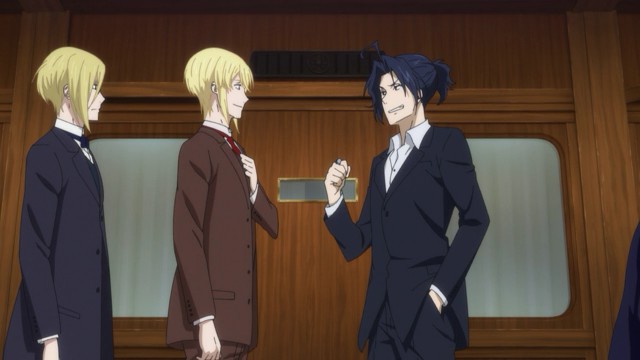
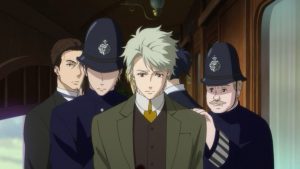






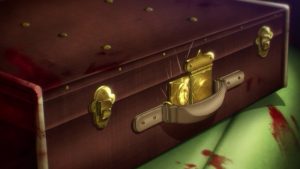
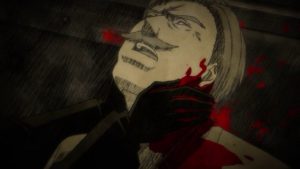






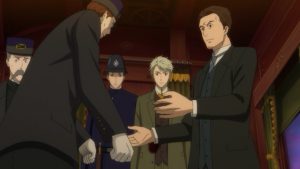
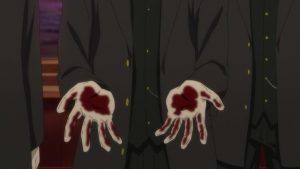
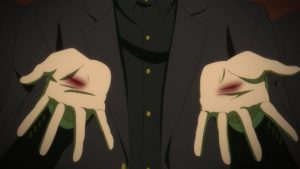














Princess Usagi
December 22, 2020 at 9:03 amIt would have made sense for the killer to remove the gloves and jacket prior to bloodshed, avoiding the need to wash in the 1st place. It sounds like the killing was an unexpected addition to the crime, so I guess the surprise didn’t leave time to plan for packing a spare set, much less removing them.
Guardian Enzo
December 22, 2020 at 4:38 pmI was more wondering if packing spares would be standard procedure for such railway men. I suppose if it wasn’t an overnight journey it might not be.
I think the key is indeed that the killer didn’t expect there to be bloodshed. Indeed for a theft gloves would have been preferred, if indeed the coachman was sophisticated enough to be concerned about fingerprints.